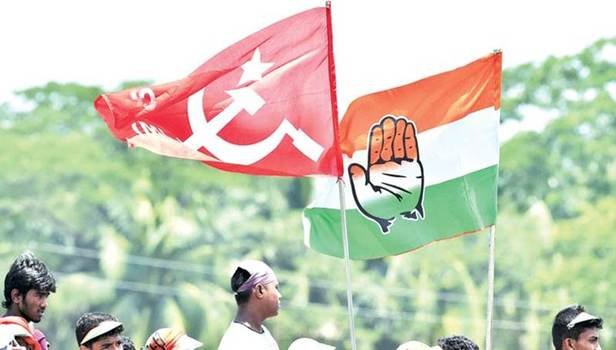CM Vijayan Said, The Banning of Sale of Cattle for Slaughter was a 'Fascist and Anti-Federal Move'
27 May 2017 ( IBTN News Bureau )
Modi’s three-year anniversary was significant in ways more than one. It coincided with the Centre’s decision to ban sale of cattle for slaughter in animal markets across the country.
While some believe these restrictions will regulate illegal slaughter, others see this move as religious propaganda and a threat to human rights.
These new rules only ban cattle trading for slaughter in animal markets and not between individuals.
The restrictions were approved by former environment minister Anil Madhav Dave before his death last week, Hindustan Times reported. A Firstpost report says the government aims to improve the conditions of animals in these markets through the move.
All states except Kerala, Meghalaya, Mizoram and Nagaland already have strict cattle slaughter laws in place.
Cattle traders will now be required to give an undertaking that the animals brought to the market are being sold only for agricultural purposes. The purchaser isn’t allowed to resell the cattle for slaughter. Documentary proof is required to ensure the purchaser is an agriculturalist.
Before these rules were introduced, there were no records maintained or liability placed on cattle traders. The animals that were sold could be suffering from contagious diseases and could consequently be transmitted to consumers, told the managing director of Humane Society International/India to Firstpost.
CATTLE: The term cattle refers to cows, bulls, bullocks, buffaloes, steers, heifers and calves, as well as camels. 'Young' and 'unfit animals' cannot be sold. Cattle will now only be sold to a person who has documents to prove he is an 'agriculturist'.
If someone wants to sell their cattle for slaughter, it could be done legally outside the animal markets subject to slaughter rules implemented in each state.
The problem is, till now, majority of cattle trading was happening in animal markets. Over time, the animal markets had become a convenient site for farmers to make sales for slaughter and other purposes.
Additional precaution is to be taken regarding animal markets in border areas. The District Animal Market Monitoring Committee has been directed to ensure that no animal market is organised in a place which is situated within twenty-five kilometers from any state border or which is situated within fifty kilometers from any international border.
The rules, highly specific, will affect the poor and illiterate who will now have to go through hefty paperwork to buy a cow for agriculture and prove it is for that purpose only.
Scroll has reported that farmers’ unions see the new rules as an assault on agriculture. They said that in a time of distress, sale of cattle was one of the important ways through which a farmer overcomes financial difficulties. Enacting such stringent rules to regulate sale of cattle will push farmers further into debt.
Vijoo Krishnan, national joint secretary of the All India Kisan Sabha expressed his concern for the same, “To say you cannot sell the cattle for six months from the date of purchase or cannot sell infirm cattle will cripple the farmer in a drought situation.”
The impact will extend to industry and export – especially Muslim traders. DB Sabharwal, secretary general, All India Meat and Livestock Exporters Association, said that “90 percent of buffaloes are sourced from mandis by middlemen for sale in slaughterhouses against a mere 10 percent that is bought directly from farmers,” as reported by The Hindu. He adds he is skeptical about the implementation of this move as regulation of livestock falls under the purview of state governments and not the Centre.
While the Supreme Court has stayed out of this matter, the directive itself was in response to a 2014 writ petition by Gauri Mulekhi of People For Animals (PFA).
While the Supreme Court banned the bull-running sport jallikattu as cruel, it refused to intervene with states to frame a uniform policy on cattle slaughter.
Mulekhi told The Hindu that the rules will help greatly in eliminating the “middleman” from the process of buying and selling, and link farmers directly to slaughterhouses. “This will improve traceability, curb illegitimate slaughter and smuggling and, put the onus on cattle-owners to dispose of their animals responsibly,” she said.
Opposition parties have criticised the Centre’s move as being against the citizens’ right to food as well as diversity of religious faiths.
Kerala Chief Minister Pinarayi Vijayan said that the banning of sale of cows and buffaloes for slaughter was a “fascist and anti-federal move”. The Centre cannot prepare a menu for the people of the country, the state’s Left government told Hindustan Times on Friday.
An official statement from CPI also termed the decision as “most unwise” and alleged that it was taken by the RSS. It has been a long-standing demand of the RSS to ban cow slaughter across the country.
CMO Kerala tweeted, ''With effective ban on cattle slaughter, food consumption of millions affected. Clear attack on our plurality, the essence of India.''
Concerns have been raised in the Northeast as well. “It is a very bad decision. We don’t agree to it and won’t implement it,” said Mizoram’s animal husbandry minister C Ngunlianchunga.
(Click here for Android APP of IBTN. You can follow us on facebook and Twitter)
Share This News
About sharing
-
 16 Sep 2025
UN inquiry finds Israel’s war on Gaza to be genocide
16 Sep 2025
UN inquiry finds Israel’s war on Gaza to be genocide
UN inquiry finds Israel’s war on Gaza to be genocide
-
 16 May 2025
Has Donald Trump taken US-Gulf relations to a new era?
16 May 2025
Has Donald Trump taken US-Gulf relations to a new era?
Has Donald Trump taken US-Gulf relations to a new era?
May 16, 2...
-
 16 May 2025
What do the Gulf states gain from the US president's historic trip to the region?
16 May 2025
What do the Gulf states gain from the US president's historic trip to the region?
What do the Gulf states gain from the US president's historic trip to the regio...
-
 15 May 2025
Pakistan FM: US didn't force the ceasefire with India | Talk to Al Jazeera
15 May 2025
Pakistan FM: US didn't force the ceasefire with India | Talk to Al Jazeera
Pakistan FM: US didn't force the ceasefire with India | Talk to Al Jazeera
-
 15 May 2025
How will the lifting of US sanctions help Syrians rebuild their country?
15 May 2025
How will the lifting of US sanctions help Syrians rebuild their country?
How will the lifting of US sanctions help Syrians rebuild their country?



